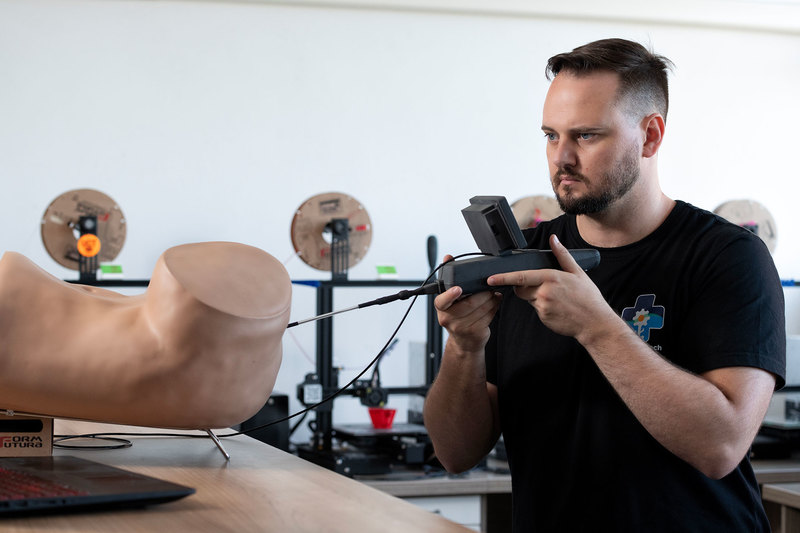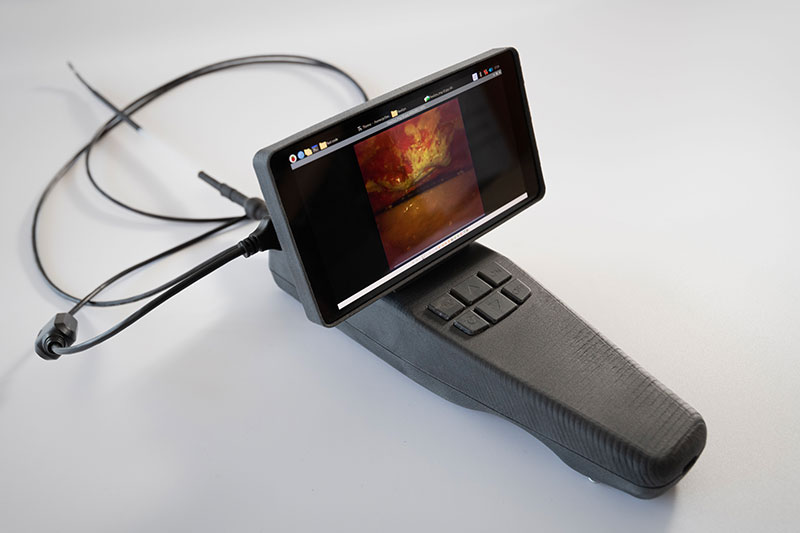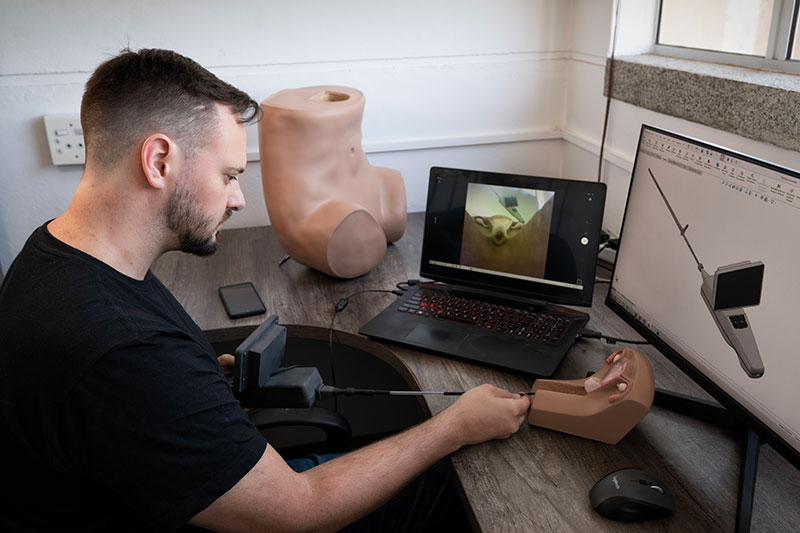PhD candidate’s innovation tackles women’s health on the ground
13 December 2022 | Story Niémah Davids. Photos Supplied. Read time 6 min.
Sexual and reproductive ill-health accounts for one third of the global disease burden among women and adolescent girls of reproductive age. Despite many advances in access to healthcare, thousands of women and girls who live in remote, resource-constrained communities still struggle to access the care they need.
But Edmund Wessels, a University of Cape Town (UCT) biomedical engineering PhD candidate, will stop at nothing to change this. His solution is a nifty, innovative and easy-to-use gynaecological device that allows gynaecologists to diagnose and treat uterine-related challenges without using general anaesthesia. This means that patients can receive the gynaecological care they need easily, and at a clinic closer to home – without the hassle of having to travel long distances at unaffordable rates to access a primary healthcare facility.
The device was co-invented with Professor Sudesh Sivarasu, the director of UCT’s Biomedical Engineering Research Centre and the head of UCT’s MedTech. Wessels said the idea to develop the innovation came after the late Dr Carol Thomas, a UCT specialist gynaecologist, alerted the MedTech team to an unmet clinical need that involved medical equipment. The team put on their thinking caps and what followed was a device that is well-suited for use in a doctor’s office, as well as in clinics in remote communities that lack proper medical infrastructure. And by adopting use of the innovation, clinics can also eliminate old, outdated equipment.
“Our device was designed with both the physician and patient experience in mind.”
“Our device was designed with both the physician and patient experience in mind. [It’s the] complete solution to the challenges they face,” Wessels said.
A flexible, user-friendly device
FlexiGyn™ is a portable device fitted with a built-in light and camera attached to a small diameter flexible scope. The device has been designed to provide user-controlled bending in multiple directions and contains a display screen that provides the clinician with the best view of the uterus, without causing the patient pain or discomfort. And thanks to its accurate mini-scope navigation tool, clinicians can access the uterus easily to pinpoint diagnoses.
Wessels said because routinely used hysteroscopy systems used by clinicians to examine the uterus are rigid and require sizeable visualisation equipment to get the job done, FlexiGyn™ is a valuable, modern, out-of-the-box alternative. The device is battery-operated, can easily be held in one hand to accurately perform the uterine exam and is guaranteed to improve the experience for both the clinician and the patient. The device makes use of a disposable cover to eliminate the lengthy time-consuming sterilisation process and to ensure improved and efficient ways of working. The cover also provides tiny passages that allow saline solution to pass through to inflate the uterus.

“We’re aiming to empower specialists with the equipment they need to provide women with improved access to critical care. FlexiGyn™ was designed to streamline the healthcare process without ignoring the patient aspect,” he said.
Trialled and tested
Wessels said FlexiGyn™ has already passed a significant step in the testing process. The device was trialled by a team of gynaecologists who were pleased with its functionality. Currently, Wessels and his team have partnered with a team of regulatory and manufacturing experts to take FlexiGyn™ one step further – from development to manufacturing phase.
“It is quite a journey to commercialise a medical device,” he said. “Our start-up, VAS MedTech, is working with the university’s Research, Contracts and Innovation office to ensure FlexiGyn™ makes it all the way into the hands of gynaecologists. We have a plan to do this and are currently raising funds to implement it.”
Notable nomination
Wessels’s invention has also recently been nominated for the 2023 Africa Prize for Engineering Innovation. He is one of 15 up-and-coming African entrepreneurs to be shortlisted for this prestigious prize. Every year, the Royal Academy of Engineering recognises and rewards young African innovators who are making giant strides in their respective fields by developing scalable engineering solutions to local challenges. The prize is the largest of its kind in Africa.
“As a continent we face many unthinkable challenges and access to healthcare really should not be one of them. I hope FlexiGyn™ will improve health outcomes for many women and young girls on the continent.”
The academy will select four finalists to pitch their inventions and business plans to a panel of judges at an event in Ghana in July. The winner will receive £25 000 (approximately R540 000), and three runners-up will win £10 000 (approximately R216 000) each. An additional One-to-Watch award of £5 000 (approximately R108 000) will be given to the most promising entrepreneur from the remaining shortlist. Innovators shortlisted for the Africa Prize will also benefit from a unique package of support including business incubation, mentoring, fundraising and communications. The package also includes access to the academy’s global network of high-profile and highly experienced engineers and business experts in the United Kingdom and Africa.

“I am incredibly honoured and delighted by this nomination and by the fact that FlexiGyn™ has been recognised among some of the continent’s best inventions. All these incredibly talented inventors have one goal and that is to improve some of the harsh realities Africans are faced with every day,” Wessels said. “As a continent we face many unthinkable challenges and access to healthcare really should not be one of them. I hope that FlexiGyn™ will improve health outcomes for many women and young girls on the continent.”
 This work is licensed under a Creative Commons Attribution-NoDerivatives 4.0 International License.
This work is licensed under a Creative Commons Attribution-NoDerivatives 4.0 International License.
Please view the republishing articles page for more information.










